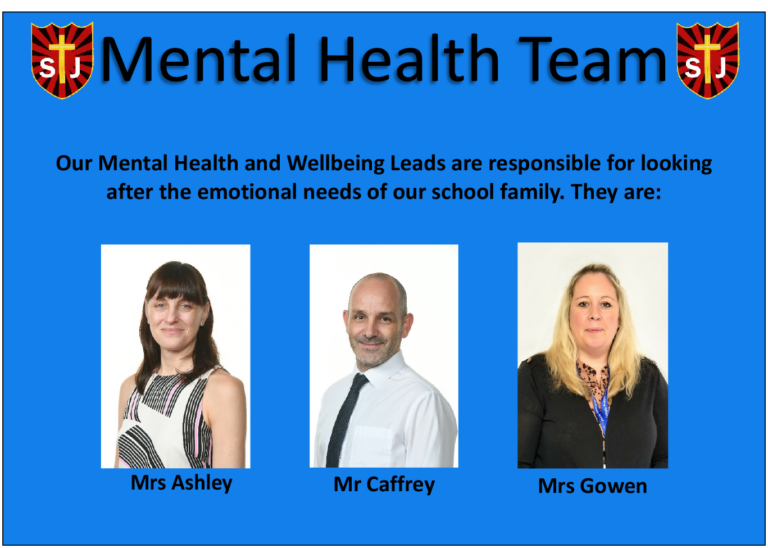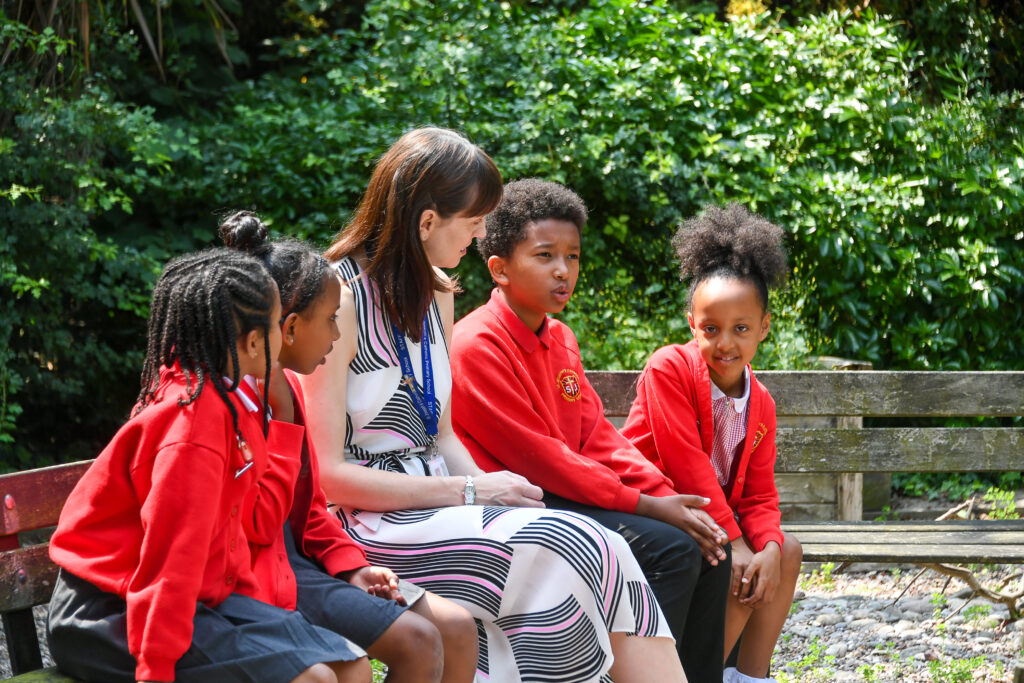Mental Health and Wellbeing
We believe, here at St Joseph’s Catholic Primary School, in promoting positive mental health and emotional wellbeing to ensure that the school is a community where everyone feels able to thrive.
This page will be used to give any relevant websites and/or resources parents and children can use in supporting the mental health and wellbeing of themselves and others.
Our school’s mission, ethos and values underpin everything that we do.

Who has mental health and what is it?
We all have mental health – some people call this emotional health or wellbeing. Mental health includes our emotional, psychological and social wellbeing. It affects how we think, feel and act. It also helps determine how we handle stress, relate to others, and make choices. Mental health is important at every stage of life, from childhood and adolescence and throughout adulthood.
The World Health Organisation defines mental health as a state of wellbeing in which every individual achieves their potential, copes with the normal stresses of life, works productively and fruitfully, and is able to make a contribution to their community.
Good mental health and wellbeing is just as important as good physical health. Like physical health, mental health can range across a spectrum from healthy to unwell; it can fluctuate on a daily basis and change over time.
Most children grow up mentally healthy, but surveys suggest that more children and young people have problems with their mental health today than 30 years ago. It is thought that this is probably because of changes in the way that we live now and how that affects the experience of growing up
What helps?
Things that can help keep children and young people mentally well include:
Having time and the freedom to play indoors and outdoors.
Being part of a family that gets along well most of the time.
Being in good physical health, eating a balanced diet and getting regular exercise.
Taking part in local activities for young people.
Going to a school that looks after the wellbeing of all its pupils.
Spending time with family and friends.
Other factors are also important, including:
Feeling loved, trusted, understood, valued and safe.
Being hopeful and optimistic.
Accepting who they are and recognising what they are good at.
Being interested in life and having opportunities to enjoy themselves.
Being able to learn and having opportunities to succeed.
Having a sense of belonging in their family, school, and community.
Feeling they have some control over their own life.
Having the strength to cope when something is wrong (resilience), and the ability to solve problems.
What happens in school?
In our school, we teach children about what it means to have good mental health and wellbeing throughout our curriculum and daily practice.
Our Catholic Life work and our PSHE curriculum, focuses on developing children’s social and emotional skills which can prevent poor mental health from developing, and help all children cope effectively with setbacks and remain healthy. It is about helping children to understand and manage their thoughts, feelings, and behaviour, and build skills that help them to thrive, such as working in a team, persistence, and self-awareness.
Through our Jesuit values, the children learn to understand, promote, and maintain their own wellbeing, and demonstrate concern, consideration, and support for others.
In school, we have Mental Health and Wellbeing Leads, who are responsible for the emotional needs of the school family. They are Mrs M Ashley, Mr C Caffrey, and Mrs Gowen.
We also have a team of children in school called our ‘Wellbeing Champions’ and they work together to ensure all children’s mental health and wellbeing is looked after. They hold regular meetings in school, with our Learning Mentor, and think and develop ways they can promote and support this in school.
Posters are displayed around school of the wellbeing leads, and there is a display board of our Wellbeing Champions, so the children and staff know who they are in school, and go to for support, advise, or share ideas with, for developing wellbeing in school.
What if my child is experiencing difficulties with their mental health and wellbeing?
Mental health doesn’t mean being happy all the time, and neither does it mean avoiding stresses altogether. One of the most important ways to help your child is to listen to them and take their feelings seriously.
In many instances, children and young people’s negative feelings and worries usually pass with the support of their parents and families. It is helpful for the school to know what they are going through at these times, so that staff can be aware of the need and support this.
Coping and adjusting to setbacks are critical life skills for children, just as they are for adults, but it is important that they develop positive, rather than negative, coping skills.
If you are ever worried about your child’s mental health and wellbeing then, just as you would about any concerns that you have about their learning, come and talk to us. Sometimes, children will need additional support for a short period – this may be in the form of a daily check-in with a trusted adult, time to talk through what they are feeling, and support in developing ways of moving forwards with this.
If your child is distressed for a long time, if their negative feelings are stopping them from getting on with their lives, if their distress is disrupting family life, or if they are repeatedly behaving in ways you would not expect at their age, then please speak to us.
Looking after yourself
If things are getting you down, it’s important to recognise this. Talk to someone you trust and see what they think. It is easy to go on struggling with very difficult situations because you feel that you should be able to cope and don’t deserve any help.
Come and talk to us in confidence, and let us know when things are tough. As much as you try to hide how you are feeling from your child, they will notice even the smallest changes.
Go to your GP if things are really getting on top of you. Asking for some support from your doctor, or a referral to a counselling service is a sign of strength. You can’t help your child if you are not being supported yourself.
Relevant Websites
Wellbeing Pioneer School
As of Spring 2023, we are currently taking part in a ‘Raising Attainment with Wellbeing’ project in school that focuses on the wellbeing of children and its importance in helping them to achieve well in school.
As part of this we have started many new initiatives in school, including our Wellbeing Champions, who are currently developing a new anti-bullying strategy, our lunchtime board games clubs and a staff wellbeing team.
The aim of this project is to raise the profile of good mental health across the school and to support in helping positive experiences during the school day.
We are proud to say that we have now been named a ‘Wellbeing Pioneer School’ and awarded a quality mark for this.
As we continue through this project and look at further improving the wellbeing of our children, staff and families, we hope to share lots more exciting initiatives with you.

National Wellbeing Gold Award
As of January 2024, we have achieved a National Wellbeing Gold Award, this is in acknowledgment of our participation in the Raising Attainment with Wellbeing Programme: Putting wellbeing at the heart of learning, teaching and leadership.
Over the last year, the staff and the children have worked on a number of initiatives to raise the profile of wellbeing in school, including joint anti-bullying assemblies with 2 other schools and a lunchtime games club. While working through this award we have established groups of children to support the other children in school. These children are known as our Wellbeing Champions and Game Club Buddies. They have help to develop and now actually run our lunchtimes games club. They have also helped to develop a new Anti-Bullying Charter in school and have had an inputin the school’s new Anti-Bullying Policy. This policy has also had input from a number of stakeholders in our school community e.g. staff, children and parents. We are now proud to say we are also a National Wellbeing Gold School, with another Quality Mark and Gold Certificate.
Online Safety
At St Joseph’s we take online safety of our children very seriously and use a variety of programs and services to keep children safe in school. We are also here to help you, as parents and carers, to keep your children safe online when they are outside of school. We regularly send out information and updates in our weekly newsletter and also send home a monthly Online Safety newsletter by email with our newsletter.







Below you will find some useful links and information
Keeping your Children Safe – Digital Safeguarding
Here are some things you may want to do to help your children ‘Stay Safe’ in the online world:
- Set ground rules and with younger children agree which websites they can visit. Remember these will vary depending upon the ages of your children.
- Agree time limits and regular breaks. Remember letting children play video games just before bedtime may stop them sleeping and have an impact on their learning.
- Find out how to set the parental controls and safe search. Consider buying parental monitoring/ control software for younger children. Remember none of these are 100% effective and supervision is always needed.
- Check the home page of your children’s favourite social network, game and so on. This will give you an overview of the website and its suitability.
- Spend 30 minutes watching your children play an online game so that you can see the content and be happy that it is suitable for them.
- Check the age ratings of games at PEGI. Remember video games ratings are all about the content and not the difficulty of the game.
- Say NO to your child playing any game that has a rating of 18 years and above or using websites that you think are unsuitable.
- Talk to your children about their privacy settings and ask them to show you how to change these settings. Encourage your children to only have online friends that know in the real world.
- Tell your children what to do if they ever feel frightened or scared when online or using their mobile phone. It is important that your children know they can always talk to you and you will help them (you may not know the answer but by talking to the school, other parents, ThinkUknow FAQs, mobile phone provider and so on you will be able to find a solution.
Useful Websites
The following websites are useful for further guidance and support:
- BBC Own It – advice for children on online safety.
- Child Protection Company: eSafety Course for Parents – by taking the Parent eSafety course, you can work with your child to keep them safe on the internet and learn more about eSafety yourself as a parent.
- Childnet International – for primary children.
- Childnet International – for teachers and professionals.
- Everybody Plays – a parent’s guide to games.
- Facebook Safety Centre – guides to Facebook settings.
- GetNetWise
- Internet Matters – a guide to help you through the many issues children can experience when using the internet.
- Internet Watch Foundation – the UK Hotline for reporting criminal online content.
- NSPCC – doing everything possible to keep childhood safe from abuse, so children can grow up healthy and thrive.
- Parent Info: Digital resilience – a parent’s guide
- Parent Info: Snapchat – a parent’s guide
- Parent Info: how to tell if your child is addicted to tech
- Parent Info: Pokemon Go – a parent’s guide
- Report Online Terrorist Material (gov.uk) – report illegal terrorist information, pictures or videos you’ve found on the internet. Your report will be treated anonymously.
- Southwest Grid for Learning Staying Safe Resource
- ThinkUKnow – learning resource for children.
- Tiger Mobiles – how to protect your children on their smartphone.
- Transl8it
- UK Safer Internet Centre: Parental Controls – how to set up parental controls offered by your home ISP.



